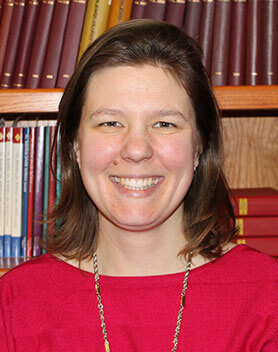
I currently serve as Director of Research and Collections at The Jacob Rader Marcus Center of the American Jewish Archives (AJA) located on the Cincinnati campus of Hebrew Union College-Jewish Institute of Religion. Originally from Montreal, my husband and I moved to Cincinnati in 2005 for his employment. I had not yet completed my dissertation at McGill University and was actively doing research in different archives in Israel and the U.S., including the AJA. Earning a doctorate was my goal. As I moved towards completing my dissertation, I already knew that I was not looking for a faculty position. Teaching was not a passion of mine. I felt that my skills could be applied differently, but at the same time I didn’t want to leave a field of learning that had nourished me intellectually for so many years.
In 2007, I was approached by the executive director of the AJA, Dr. Gary P. Zola, about serving as part-time managing editor of its peer-reviewed academic journal in American Jewish history. I quickly discovered that working on the journal allowed me to remain in the field while also offering me the opportunity to explore a career in archives, which I honestly had not thought of as a possibility until then. What I quickly learned was that archives themselves had rich histories and that there were many facets of archival work that were both challenging and rewarding. Over the years, my portfolio expanded to include directing the AJA’s fellowship program, working closely with the HUC-JIR students, overseeing the process of acquisition, collection development, and partnering with my colleagues on public programming, tours, and various community initiatives. I am still involved in professional associations such as the AJS (I am proud to say that the AJA is the repository of AJS’s organizational records), I present my work at conferences, and I sit on several boards, including the Southern Jewish Historical Society. I feel respected in the work that I do and in turn I can offer critical support to my colleagues who have teaching and publishing obligations. Additionally, working with fellows doing research in the archives gives me a first-hand view of the newest research in the field and puts me in a position to help young scholars form collegial networks. Having done significant archival research, I understand that world well and in many ways my work in the archives is a bridge between the academic and the archival. Working in a supervisory role, my managerial and leadership skills have been strengthened. I have also developed pedagogic skills in public history as I am often asked to teach to school groups, visiting congregations, as well as local and international guests. Working with the public on a daily basis is one of the things I love most about my job. The flip side of my expanded portfolio is that it leaves me less time for research and writing, which I miss, although the AJA’s leadership encourages my writing and publications.
The advice I would offer early career scholars in Jewish Studies who are thinking of a career pivot—and I really wouldn’t call mine a pivot at all—is to think broadly about the skills you have acquired in graduate school, how you may apply those to your different areas of interest and that also speak to where your strengths lie. Finally, be open to other job opportunities that might come your way because they just might lead you to a job you love. Earning a PhD might be the only path to becoming a university professor, but being a university professor is certainly not the only path for a person with a PhD.